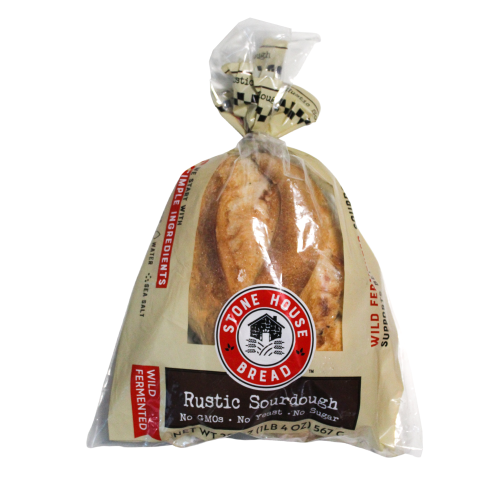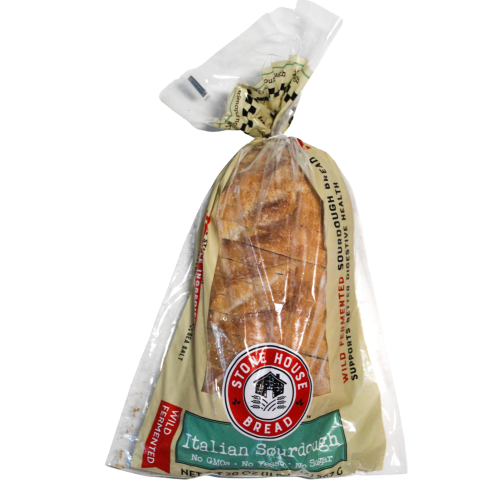Read Our Blog

The Importance of Organic Sourdough Bread for Fructan Intolerance
If you’ve struggled with stomach issues despite going gluten-free, or if you have a diagnosis of irritable bowel syndrome (IBS) but still can’t pinpoint the troublesome foods, you might be dealing with fructan intolerance. Understanding this condition and the role of certain foods, like organic sourdough bread, can make a significant difference in managing your symptoms.
What are Fructans and Why Do They Matter?
Fructans are a type of carbohydrate that some people find difficult to digest. Their symptoms often mimic gluten intolerance, making it tricky to identify the real culprit. Registered dietitian Beth Czerwony, RD, LD, explains that fructans belong to a group of small-chain carbohydrates called FODMAPs. These naturally occurring sugars are found in a variety of foods, many of which are staples in our diet.
For people with fructan intolerance, consuming high-fructan foods can lead to unpleasant symptoms such as bloating, diarrhea, gas, and stomach pain.
Organic Sourdough Bread: A Digestible Option
When dealing with fructan intolerance, the choice of bread can significantly impact your digestive health. This is where organic sourdough bread comes into play. Here’s why it’s important:
1. Lower Fructan Levels: Sourdough fermentation breaks down some of the fructans in wheat, making it easier to digest compared to regular bread. This process can help alleviate some of the digestive discomfort associated with fructan intolerance.
2. Beneficial Bacteria: The natural fermentation process used in sourdough baking encourages the growth of beneficial bacteria. These bacteria can improve gut health and enhance digestion, which is particularly beneficial for individuals with sensitive digestive systems.
3. Reduced Gluten Content: While not completely gluten-free, sourdough bread typically has lower gluten content due to the fermentation process. For those who are also sensitive to gluten, this can be an added benefit.
4. Nutrient-Rich: Organic sourdough bread is often made with whole grains and organic ingredients, ensuring you get a nutrient-rich product. This aligns with a healthy diet and provides essential nutrients without the added chemicals or preservatives found in many commercial breads.
Why Organic Matters
Choosing organic sourdough bread adds another layer of benefits. Organic farming practices avoid synthetic pesticides and fertilizers, which means you’re consuming fewer harmful chemicals. This can be particularly important for individuals with digestive issues, as these chemicals can sometimes exacerbate symptoms.
Moreover, organic grains are often richer in nutrients because they are grown in healthier soils. This contributes to the overall quality of the bread, making it a healthier option for those with fructan intolerance or other digestive concerns.
Stone House Bread: A Commitment to Quality
At Stone House Bread, we understand the importance of using high-quality, organic ingredients to create bread that not only tastes amazing but also supports your health. Our organic sourdough bread is crafted with care, following long and slow traditional fermentation methods that enhance its digestibility and nutritional value.
**1. Organic Ingredients: We source the finest organic grains to ensure our bread is free from synthetic pesticides and chemicals. This commitment to organic farming supports both your health and the environment.
**2. Artisanal Fermentation: Our sourdough bread is fermented over a long period, allowing beneficial bacteria to thrive. This natural process not only reduces fructan and gluten levels but also contributes to the bread’s distinctive, delicious flavor.
**3. Handcrafted Quality: Each loaf of Stone House Bread is handcrafted with love and expertise. We believe in maintaining the integrity of traditional baking techniques to deliver a product that stands out in both taste and health benefits.
**4. Community and Sustainability: We are dedicated to supporting our local community and promoting sustainable practices. By choosing Stone House Bread, you are not only making a healthy choice for yourself but also contributing to a healthier planet.
Tips for Including Stone House Bread in Your Diet
If you suspect you have a fructan intolerance, incorporating Stone House Bread’s organic sourdough bread into your diet can be a positive step. Here are some tips to help you get started:
- Start Slow: Introduce sourdough bread gradually to monitor how your body reacts. Keep a food diary to track any symptoms and adjust your intake accordingly.
- Combine with Low-Fructan Foods: Pair Stone House organic sourdough bread with foods that are low in fructans to create balanced meals that are easier on your digestive system. For example, enjoy it with eggs, avocado, or lean meats.
- Consult a Dietitian: Work with a dietitian to develop a meal plan that suits your needs. They can provide personalized advice and help you navigate any dietary restrictions.
Conclusion
For those dealing with fructan intolerance, Stone House Bread’s organic sourdough bread can be a game-changer. Its natural fermentation process, lower fructan and gluten content, and nutritional benefits make it a digestible and healthy option. By choosing organic, you also avoid unnecessary chemicals and enjoy a product that aligns with a balanced, nutrient-rich diet.
If you’re experiencing unexplained digestive issues, consider the role of fructans in your diet and explore the benefits of Stone House Bread’s organic sourdough bread. It might just be the delicious and healthy solution you’ve been looking for.
This research is credited to the Cleveland Clinic Health Essentials website.



